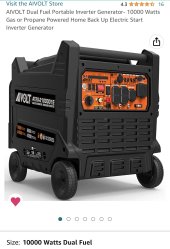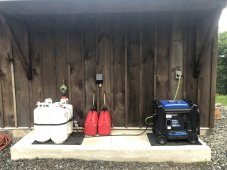Andersonjk4
New Member
I need help with figuring out a generator selection for my upcoming off-grid home build. Quick details: Planning on two Schneider XW Pro+ Inverters and two Conext MPPT-80A or 100A, 18-22 kW PV array, ~50kWh LiFePO4 battery bank (to be expanded later). Location is Eastern Washington, where snow is common and several (3-5) days with very little sun happens in the wintertime (but not socked in like the west side can be). I fully expect to run a generator most days during the winter when days are short for supplemental charging, but hoping that my dependancy on full generator power will be limited. My (very conservative) estimated loads are about 32kWh per day max and 28kWh average with a peak demand of about 10kW. As far as fuel type goes I am not set on any fuel type. Although I will likely have propane on the property for supplemental heating/cooking/water-heating during the low solar production times, and I also already have a 250 gallon diesel tank. Gasoline would probably be my third choice, but not totally against it.
I am having trouble deciding on a larger (15 kW+) typical backup generator that can handle prime power and charge batteries or going with a smaller portable generator in the 7kW to 9kw range that would mainly just charge the batteries (I would likely have two at all times for redundancy). It seems like with current battery technology allowing pretty quick charging that running a smaller generator to supplement battery charging may be all that is needed. But this is my first foray into off-grid living, so maybe I am being too optimistic about a small generator (or 2 small generators in parallel) being able to charge batteries.
Any insight on generator usage for This type of system will be greatly appreciated.
I am having trouble deciding on a larger (15 kW+) typical backup generator that can handle prime power and charge batteries or going with a smaller portable generator in the 7kW to 9kw range that would mainly just charge the batteries (I would likely have two at all times for redundancy). It seems like with current battery technology allowing pretty quick charging that running a smaller generator to supplement battery charging may be all that is needed. But this is my first foray into off-grid living, so maybe I am being too optimistic about a small generator (or 2 small generators in parallel) being able to charge batteries.
Any insight on generator usage for This type of system will be greatly appreciated.




